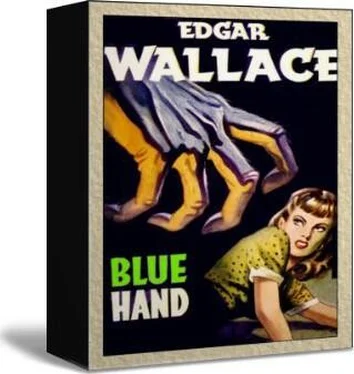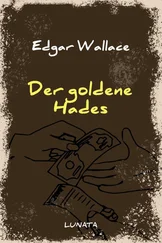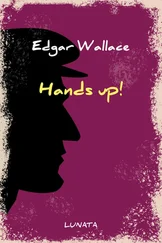Edgar Wallace - Blue Hand
Здесь есть возможность читать онлайн «Edgar Wallace - Blue Hand» весь текст электронной книги совершенно бесплатно (целиком полную версию без сокращений). В некоторых случаях можно слушать аудио, скачать через торрент в формате fb2 и присутствует краткое содержание. Год выпуска: 0101, Жанр: Старинная литература, на английском языке. Описание произведения, (предисловие) а так же отзывы посетителей доступны на портале библиотеки ЛибКат.
- Название:Blue Hand
- Автор:
- Жанр:
- Год:0101
- ISBN:нет данных
- Рейтинг книги:3 / 5. Голосов: 1
-
Избранное:Добавить в избранное
- Отзывы:
-
Ваша оценка:
- 60
- 1
- 2
- 3
- 4
- 5
Blue Hand: краткое содержание, описание и аннотация
Предлагаем к чтению аннотацию, описание, краткое содержание или предисловие (зависит от того, что написал сам автор книги «Blue Hand»). Если вы не нашли необходимую информацию о книге — напишите в комментариях, мы постараемся отыскать её.
Blue Hand — читать онлайн бесплатно полную книгу (весь текст) целиком
Ниже представлен текст книги, разбитый по страницам. Система сохранения места последней прочитанной страницы, позволяет с удобством читать онлайн бесплатно книгу «Blue Hand», без необходимости каждый раз заново искать на чём Вы остановились. Поставьте закладку, и сможете в любой момент перейти на страницу, на которой закончили чтение.
Интервал:
Закладка:
“That is very unsporting,” said Jim, and turning, ran in the opposite direction. He went past the cab like a flash, and heard it stop and a loud voice order the taxi to turn, and he slackened his pace. He had already decided upon his plan of action—one so beautifully simple and so embarrassing to Digby Groat and his servitors, if his suspicions were confirmed, that it was worth the bluff. He had dropped to a walk at the sight of a policeman coming toward him. As the taxi came abreast he stepped into the roadway, gripped the handle of the door and jerked it open.
“Come out,” he said sternly.
In the reflected light from the taximeter lantern he saw the damaged face of an old friend.
“Come out, Jackson, and explain just why you’re following me through the peaceful streets of this great city.”
The man was loath to obey, but Jim gripped him by the waistcoat and dragged him out, to the taxi-driver’s astonishment. The second man was obviously a foreigner, a little dark, thin-faced man with a mahogany face, and they stood sheepishly regarding their quarry.
“Tomorrow you can go back to Mr. Digby Groat and tell him that the next time he sets the members of the Thirteen Gang to trail me, I’ll come after him with enough evidence in each hand to leave him swinging in the brick-lined pit at Wandsworth. Do you understand that?”
“I don’t know what you mean about tomorrow,” said the innocent Jackson in an aggrieved tone. “We could have the law on you for dragging us out of the cab.”
“Try it, here comes a policeman,” said Jim. He gripped him by the collar and dragged him toward the interested constable. “I think this man wants to make a charge against me.”
“No, I don’t,” growled Jackson, terrified as to what his master would say when he heard of this undramatic end to the trailing of Jim.
CHAPTER TWENTY-THREE
THERE is little that is romantic about a Police Station, and Digby Groat, who came in a towering rage to release his servants, was so furious that he could not even see the humorous side of the situation.
Once outside the building he dismissed one, Antonio Fuentes, with a curse, and poured the vials of wrath upon the unhappy Jackson.
“You fool, you blundering dolt,” he stormed. “I told you to keep the man in sight; Bronson would have carried out my orders without Steele knowing. Why the hell did you carry a revolver?”
“How did I know he would play a dirty trick on me like that?” growled Jackson; “besides, I’ve never heard of the Firearms Act.”
It was a stupid but a dangerous situation, thought Digby Groat, as he sat gnawing his nails in the library. It was an old theory of his that great schemes come to nought and great crimes are detected through some contemptible little slip on the part of the conspirators. What Jim had done in the simplest, easiest manner, was to set the police moving against the Thirteen, and to bring two of its members into the searching light of a magisterial inquiry. What was worse, he had associated Digby Groat with the proceedings, though Digby had an excuse that Jackson was his valet, and, as such, entitled to his interest. He had disclaimed all knowledge of Fuentes, but, as an act of generosity, as the Spaniard was a friend of his servant, had gone bail for him also.
Had the Thirteen brought off a big coup, their tracks would have been so hidden, their preparations so elaborated, that they would have defied detection. And here through a simple offence, which carried no more than a penalty of a five-pound fine, two of the members of the gang had come under police observation. Madmen!
It was a sleepless night for him—even his three hours was denied him. The doctor attending his mother did not leave until past three o’clock.
“It is not exactly a stroke, but I think a collapse due to some sudden shock.”
“Probably you’re right,” said Digby. “But I thought it best to call you in. Do you think she will recover?”
“Oh. yes. I should imagine she’ll be all right in the morning.”
Digby nodded. He agreed with that conclusion, without being particularly pleased to hear it.
Difficulties were increasing daily, it seemed; new obstacles were besetting the smooth path of his life, and he traced them one by one and reduced them to a single cause—Jim Steele.
The next morning, after he had telephoned to a shady solicitor whom he knew, ordering him to defend the two men who were to be charged at Marylebone with offences under the Firearms Act, he sent for Eunice Weldon.
“Miss Weldon,” he said, “I am making changes in this house, and I thought of taking my mother to the country next week. The air here doesn’t seem to agree with her, and I despair of her getting better unless she has a radical change of environment.”
She nodded gravely.
“I am afraid I shall not be able to accompany you, Mr. Groat.”
He looked up at her sharply.
“What do you mean, Miss Weldon?” he asked.
“There is not sufficient work for me to do here, and I have decided to return to my old employment,” she said.
“I am sorry to hear that, Miss Weldon,” he said quietly, “but, of course, I will put no obstacle in your way. This has been a calamitous house recently, and your experience has not been an exceedingly happy one, and therefore I quite understand why you are anxious to leave us. I could have wished that you would have stayed with my mother until she was settled in my place in the country, but even on this point I will not press you.”
She expected that he would have been annoyed, and his courtesy impressed her.
“I shall not, of course, think of leaving until I have done all that I possibly can,” she hastened to add, as he expected her to do, “and really I have not been at all unhappy here, Mr. Groat.”
“Mr. Steele doesn’t like me, does he?” he smiled, and he saw her stiffen.
“Mr. Steele has no voice in my plans,” she said, “and I have not seen him for several days.”
So there had been a quarrel, thought Digby, and decided that he must know a little more of this. He was too wily to ask her point-blank, but the fact that they had not met on the previous day was known to him.
Eunice was glad to get the interview over and to go up to Mrs. Groat, who had sent for her a little earlier.
The old woman was in bed propped up with pillows, and apparently was her normal self again.
“You’ve been a long time,” she grumbled.
“I had to see your son, Mrs. Groat,” said Eunice.
The old woman muttered something under her breath.
“Shut the door and lock it,” she said. “Have you got your notebook?”
Eunice pulled up a chair to the bedside, and wondered what was the important epistle that Mrs. Groat had decided to dictate. Usually she hated writing letters except with her own hand, and the reason for her summons had taken the girl by surprise.
“I want you to write in my name to Mary Weatherwale. Write that down.” Old Mrs. Groat spelt the name. “The address is in Somerset-Hill Farm, Retherley, Somerset. Now say to her that I am very ill, and that I hope she will forgive our old quarrel and will come up and stay with me—underline that I am very ill,” said Jane Groat emphatically. “Tell her that I will pay her expenses and give her Ł5 a week. Is that too much?” she asked. “No, don’t put the salary at all. I’ll be bound she’ll come; they’re poorly on, the Weatherwales. Tell her she must come at once. Underline that, too.”
The girl scribbled down her instructions.
“Now listen, Miss Weldon.” Jane Groat lowered her voice. “You are to write this letter, and not to let my son know that you have done it: do you understand? Post it yourself; don’t give it to that horrible Jackson. And again I tell you not to let my son know.”
Читать дальшеИнтервал:
Закладка:
Похожие книги на «Blue Hand»
Представляем Вашему вниманию похожие книги на «Blue Hand» списком для выбора. Мы отобрали схожую по названию и смыслу литературу в надежде предоставить читателям больше вариантов отыскать новые, интересные, ещё непрочитанные произведения.
Обсуждение, отзывы о книге «Blue Hand» и просто собственные мнения читателей. Оставьте ваши комментарии, напишите, что Вы думаете о произведении, его смысле или главных героях. Укажите что конкретно понравилось, а что нет, и почему Вы так считаете.












